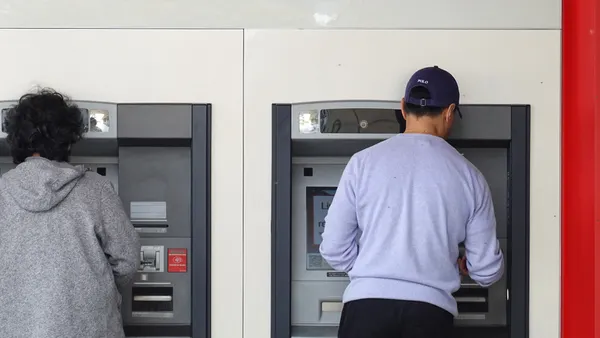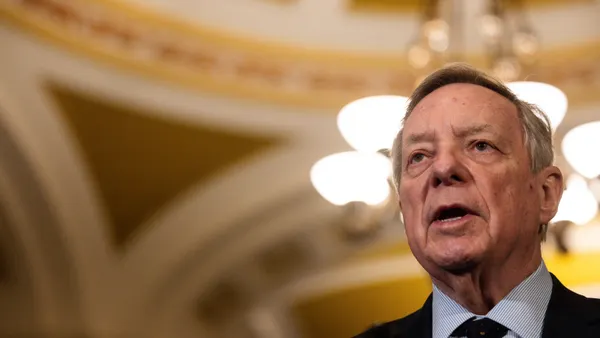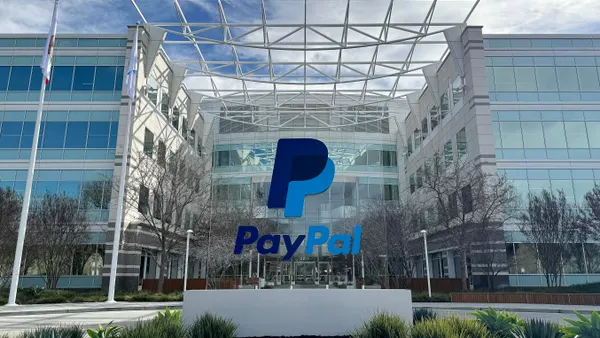The Office of the Comptroller of the Currency this week threw its weight behind an effort to thwart a new Illinois law that bans credit and debit card issuers from charging interchange fees on tips and excise taxes on consumers’ tabs.
The OCC moved to file an amicus brief in a case brought against the state by a pack of bank groups, including the Illinois Bankers Association, the American Bankers Association and America’s Credit Unions. The banks are seeking a preliminary injunction in federal court to block the law.
In its brief filed Wednesday in the U.S. District Court for Northern Illinois, the OCC echoed the bank group’s concerns that the law will be disruptive to the nationwide banking system. “The Illinois Interchange Fee Prohibition Act, H.B. 4951, Section 150 (“IFPA”) is an ill-conceived, highly unusual, and largely unworkable state law that threatens to fragment and disrupt this efficient and effective system,” the OCC said in its brief.
That new law, enacted earlier this year, would bar “a payment card network, an acquirer bank, or a processor” from receiving or charging fees on the tax amount or the gratuity associated with the sale of goods and services, according to the legislature’s summary of the bill.
The Illinois law, scheduled to take effect next July, was a win for retail organizations that have had a nationwide campaign to beat back interchange fees, which are the fees charged to retailers, restaurants and other businesses every time a consumer swipes a credit or debit card to pay for goods or services. Interchange fees are imposed by banks that issue the cards, in addition to other processing fees, including those levied by card networks, such as Visa and Mastercard.
The law, which was backed by the Illinois Retail Merchants Association, was first such statute in the country and was considered a potential template for other states that might seek to do the same. The backlash was immediate, with the group of bankers suing in August to overturn the state law.
Illinois Attorney General Kwame Raoul was in the process of trying to meet an impending deadline for responding to the plaintiffs’ request for a preliminary injunction when the OCC’s brief landed, according to a response his office filed in court Thursday. Raoul asked the court to deny the OCC’s request to file the brief, and if it won’t, the AG asked for an extension to Oct. 11 on filing a response to the preliminary injunction motion.
The OCC was adamant about the havoc it believes the law could unleash. “Although the IFPA’s requirements are vague and ambiguous in many respects, this much is clear: the IFPA prevents or significantly interferes with federally-authorized banking powers that are fundamental to safe and sound banking and disrupts core functionalities that drive the Nation’s economy,” the OCC brief said.
The OCC argued that the state law not only infringes on federally granted national bank powers, it also could disrupt efforts to fight fraud in that it seeks to limit banks’ use of credit card transaction data.
“If the interchange fee prohibition provision in the IFPA is not invalidated, it will erode this essential infrastructure, leaving national banks with extraordinary operational burdens that likely will be passed on to consumers in the form of higher fees, reduced services, and weakened fraud protection,” the OCC’s brief said.
The OCC’s concerns echo those of industry groups that have added their voices to the debate over the new law. Allowing the law to take effect while the case is pending would “have grave economic consequences, and irreparably harm many thousands of organizations that participate in the global payment system,” the Electronic Transactions Association contended in a Sept. 26 court filing seeking to submit an amicus brief.
The association represents payments companies, among others, including the card network Visa, the processor Fiserv and the fintech Block.
A hearing on the preliminary injunction is scheduled for Oct 30, an ETA spokesperson said.












